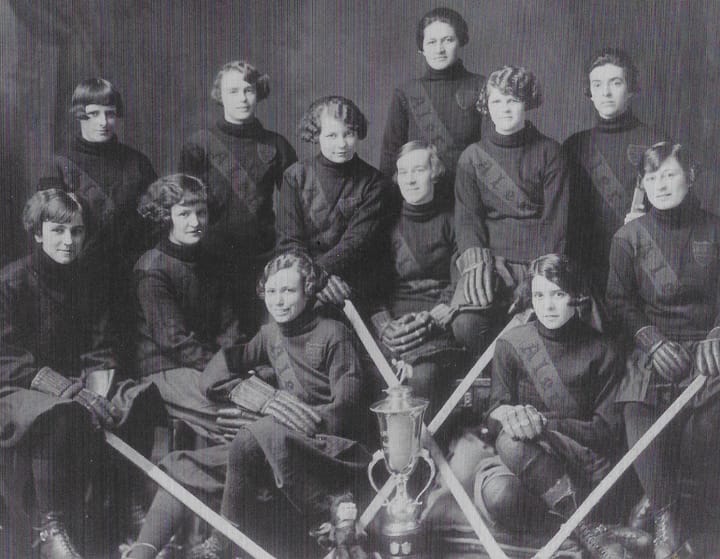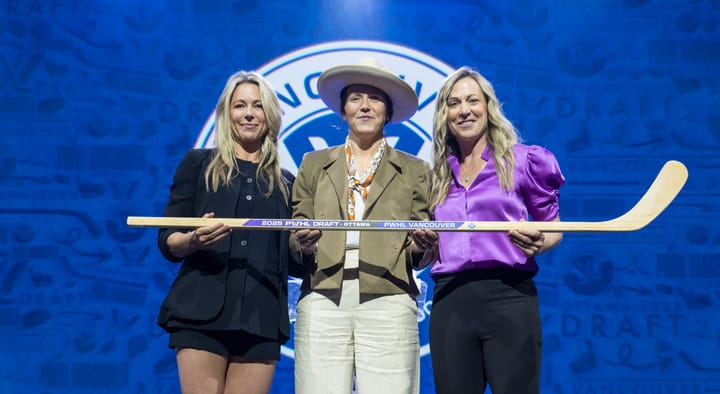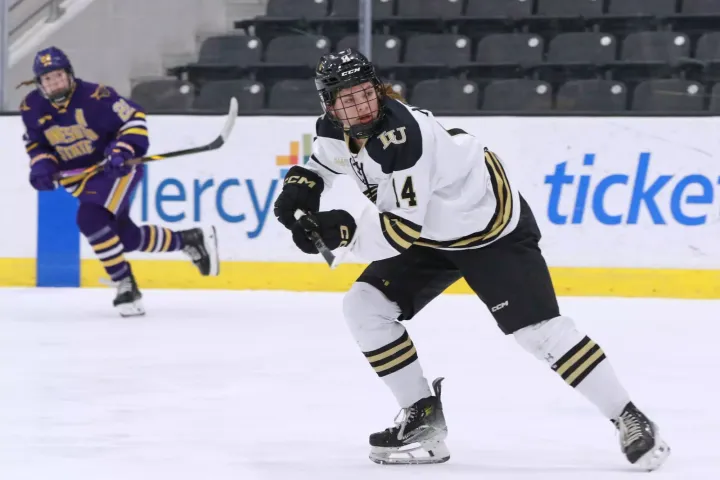From the archives: Jamie Lee Rattray’s Patty Kazmaier Season
Rattray’s honor was one of many for the 2014 Golden Knights
The day that Clarkson’s women’s hockey team left to go to the Frozen Four in 2014, the team received a nice send-off. Fans came out to wish them luck and cheer them on. There was quite a bit of pomp and circumstance, because it was the first time a Golden Knights team had ever gone.
Sitting on that bus leaving campus with his fellow coaches, Matt Desrosiers could sense that there was something special about to happen.
“I remember looking at them and saying, ‘I don’t know what’s going on with the team right now, but I think we’re going to win,’” he said.
He was right, of course. Clarkson would go on to win the school’s first national championship in any sport, spoiling Minnesota’s chance at a three-peat in the title game. It was a historic season for the program and for women’s hockey as a whole: until that point, the WCHA had won every single Division I national title.
But the 2013-14 season marked another historic first for Clarkson. Jamie Lee Rattray became the first Golden Knight to win the Patty Kazmaier Memorial Award.
When she first got to Potsdam, Rattray was a little bit of a work in progress. She was a highly-touted prospect who had dominated the Provincial Women’s Hockey League (PWHL). From the get-go, it was clear she had raw talent as a power forward and an unrelenting drive to get better. But there were a few things she needed to learn about the college game to be successful.
“She was kind of what I’d call a wild stallion when she first came in,” Desrosiers said.
“I think that’s probably the right wording,” Rattray laughed. “In junior, I think you can kind of get away with doing a lot of different things because there’s not quite as much structure and maybe the level isn’t as high. I was able to just run around and play my game and not really worry about a lot of systems and that kind of stuff, and you can’t really do that in college.”
Like pretty much every first-year player, Rattray had to figure out how to play with a bit more structure. Clarkson’s coaching staff also likes to imprint upon players the importance of playing strong defensively, and letting that translate to offensive opportunities. Rattray committed herself to that mindset as well.
It didn’t take her long to figure out how to make the necessary adjustments, becoming a well-rounded player who could dominate possession in all three zones.
Longtime teammate Erica Howe, who played with Rattray in the PWHL for two years, at Clarkson for four, and then with the Markham (formerly Brampton) Thunder following graduation, knows Rattray better than probably anyone. She remembers how quickly Rattray was able to adjust to the college game.
“It was almost like she went home at Christmas and a switch flipped that year,” Howe said. “It was like, O.K., go home, have a little bit of a breather, and then she was on fire for the rest of freshman year, and it didn’t stop from then on.”
Rattray went on to score 77 goals, 104 assists, and 181 points over the next four years. While she quickly became one of the best power forwards in the ECAC, and then the entire NCAA, she was perhaps even better known for her unstoppable work ethic.
“For me, the big thing was just to make sure that I try to bring my best every day,” Rattray said. “If I was bringing my best, then I could maybe set an example for everyone else, and maybe they would, too. That’s how you kind of start building towards championships.”
“We used to have these battle Mondays where it was just nitty gritty, it wasn’t skill development, it was just a battle for pucks, get it, and put it in the net,” Howe explained. “I remember Jamie never gave up on a puck. She was always there battling every single Monday to get those pucks out.”
Desrosiers, like many others, tuned in for ESPN’s premiere of The Last Dance. He likens Rattray’s practice habits to one of the best athletes and competitors of all time: Michael Jordan.
“Watching him in practices and stuff and the way he competed, that was Jamie Lee,” he said. “Any kind of drill that we did, she was going 100%. Any time we played a mini game or competition or anything, she was 100% wanting to win.”
That same competitive streak also led to some frustrations—particularly in practice, if she couldn’t quite master a drill or win a game.
Desrosiers recalls one drill meant to test their power-play unit. If the PP couldn’t get a shot on net within 20 seconds, their group was out.
“There were a couple times where her power-play unit went out there and they didn’t get a shot within 20 seconds, and the PK did a good job and they were kind of hollering, and Jamie Lee just got so upset,” he said. “She was so rattled by it because she was just such a competitor and stuff and she’d go off. It was kind of funny because the whole team was giggling to ourselves a little bit over how fired up she got.”
Howe tells a story of another drill, which started by rimming the puck in behind the net.
“[Desrosiers] was rimming them to her, and she could not pick it up behind the net. It bounced over her stick and exploded and went the other way,” Howe said.
“For some reason, I could not pick up the puck. I think he probably rimmed like 10 pucks,” Rattray said.
“We couldn’t start the game until she got it, and she was just losing her mind,” Howe said. “It was the simplest thing and it wasn’t even necessarily her fault that it was bouncing over her stick.”
“I would get so mad, and I remember Erica Howe being in the net and just dying laughing at me, and I would get so rattled because I’m so competitive with myself,” Rattray said.
“Honestly, we couldn’t breathe, we were laughing so hard,” Howe said.
Howe notes Rattray could get really worked up in games, too, but after 12 years playing together, she says Rattray has definitely found a more comfortable balance there. By her senior year at Clarkson, she was channeling that competitive energy to help lead her team to unprecedented heights.
“I think there were times that freshman year in that first semester where she’d be almost in tears and just get so frustrated because she just cares so much,” Howe said. “And then by her senior year, she’s wearing an A, she’s a leader on the team, and she just definitely had more maturity within her emotions and her ability to just channel it out and be comfortable being the player that she is, and come consistent every game without having anyone knock her off.”
That senior year ended up being very special for the Golden Knights in more ways than one. They would put together their first 30-win season and make it to the Frozen Four for the first time in program history.
For herself personally, Rattray says one of the things that really helped her was just going to the rink every day and enjoying it—which was made easier by the team’s whole dynamic.
“I knew that it was my last season to put something good in at that school. And every time I went to the rink, I was pretty focused, but I was also having fun and just playing the game,” she said. “I had a great group around me, and it was really, really easy to go to the rink every day and work. I think everyone knows that getting into December and January is a tough time, it’s kind of like the grind days, but we were able to keep it going and make it enjoyable for everybody.”
That 2013-14 team as a whole had quite a bit of confidence and spunk, and they showed it during the NCAA Tournament. Desrosiers says that for the seniors especially, they knew they’d put the work in not just that season but for the past four years, which is what prepped them to compete so well on a stage that was, to that point, brand new to them.
“When that senior class came into Clarkson, we were still in the building phases and we struggled a little bit the first couple years,” Desrosiers said. “They felt like they had put the work in to get us to that point, and that we could compete with any team out there. So even though we hadn’t really been in those situations before, they were just a very confident group in their abilities, and the fact that they had put in the hard work to get there.”
“That was the first time we’ve ever been in the Frozen Four and there were a lot of big programs that were there. Wisconsin was there, Minnesota,” Rattray said. “I think after we beat Mercyhurst so handily in the semifinals, we had all the confidence in the world.”
Before playing for the national championship, though, there was one more thing on the agenda for Rattray and Clarkson: the Patty Kazmaier Memorial Award presentation.
“Honestly, when I went into that weekend, I thought Hannah Brandt was going to win,” Rattray said. But the award went to her, and she became Clarkson’s first-ever Patty Kazmaier Memorial Award winner.
“They called her name, and it was just so exciting to see someone who’s such a good person and so deserving and brings that work ethic every day go up and be able to accept an award like that,” Howe said. “It was an incredible moment, and just something I’ll forever remember as teammates.”
The same day as the Patty Kazmaier banquet, Rattray remembers Clarkson strength & conditioning coach Tad Johnson pulling the team together for some inspirational words before the national title game.
“He brought us in and gave us this whole speech and said, ‘We are not losing this game,’” Rattray said. “‘There’s no way in the world that we’re losing this.’ He just gave us so much motivation.”
A lot of people watching, at the time, had written off Clarkson. But on Sunday, the Golden Knights pulled out a thrilling 5-4 victory in the national championship game over Minnesota to win their first title.
The team knew all along they were good enough to win, but Rattray’s Patty Kaz win was an extra boost going in.
“Maybe subconsciously it adds that extra piece of confidence, but I think it was more just the confidence in the team and knowing that Jamie winning an award doesn’t change anything,” Howe said. “She’s still going to be the humble person she is and bring it like we know she can.”
Looking back, that championship weekend for Clarkson brought in a wave of change for NCAA women’s hockey. It was the first time any school outside the WCHA had won a national championship, but it wouldn’t be the last. Clarkson has won two other titles since.
“From that moment on, it’s like, ‘O.K., now the barrier is broken down, now a school outside the WCHA can win a championship, someone from a small school can win the Patty Kaz,’” Howe said. “You didn’t believe it was possible before and now, it kind of is. It was just incredible to have that feeling like, ‘Wow, we actually did it, we actually pulled it off.’”
A lot went into that 2013-14 season for Clarkson; years of hard work culminated in that championship. But it also signified a beginning—the start of a very special era for the program. Along with winning the 2017 and 2018 national championships, Clarkson has also now won back-to-back Patty Kazmaier Memorial Awards, with Loren Gabel taking home the honor in 2019 and Élizabeth Giguère winning it this spring.
“To know that they went to Clarkson is something really special to me, and it just shows that the program is growing and getting better and players coming out of high school want to go there,” Rattray said. “I think that’s what you want as an alumni. To know that you were able to help build something like that is pretty special.”
In a roundabout way, that all started with Rattray, her class, and what they accomplished.
“Not only with that team but throughout her entire career, she was able to be the example and set the example for the type of team and the type of players that we wanted on our team,” Desrosiers said. “And there’s no question that we’re still reaping the benefits from that now. She was part of a group that built our program into what it is today and the style and the type of team that we want to be. She’s made such a huge impact on our program.”





Comments ()